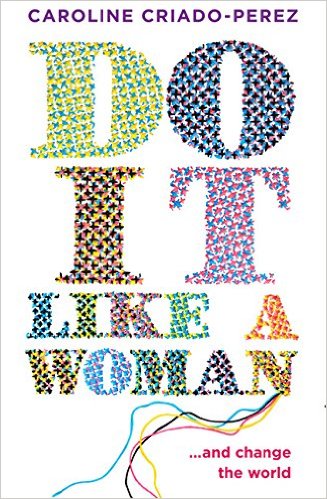Do it like a Woman
“Feminism is like a tapestry; every woman brings her own thread.”
In her book “Do it like a Woman”, Caroline talks about the palpable impact of role models which can “influence academic choices, alter knowledge of political candidates and likelihood of voting, transform public speaking ability, … “
She explains how women have better results when they read biographies of female leaders or give speeches in rooms with women’s portraits.
Through different chapters (Speaking like a Woman, Advocating like A Woman, etc…), Caroline shares the stories of multiple female role models: from Lady Anne Blunt, Victorian equestrienne and breeder of Arabian horses to South pole explorer Felicity Aston, from Women in graffiti like Femme Fierce collective to beatbox artists like Dana Mc Keon, from Sahira Sharif, founder of Mirman Baheer poetry society in Afghanistan to Mae Azango, journalist from Liberia.

“I always think of patriarchy as the film Matrix. You are living in it everyday but you don’t see it.
It’s because you live in it that you don’t see it. It’s everywhere, in everything.”
SPEAKING AS FEMALE
As a proverb from Renaissance England says: “An eloquent woman is never chaste.”, making an implicit connection between lips on the face and lips between the legs.
In Homer’s Odyssey, Telemachus tells him mum Penelope: “Speech will be the business of men, all men, and of me most of all; for mine is the power of this household.”
Since then, public speaking and oratory have been exclusive practices defining masculinity as a gender. Public speech was the defining attribute of maleness.
Undermining women’s voices as shrill or nagging implies that women don’t have a legitimate political opinion.
As Mary Beard suggests, “de-authorising and silencing women’s voices is embedded in our culture.”
Just check the data of online abuse and the dropping participation stats of women in online forums…
Andrea Dworkin adds: “Men often react to women’s words as if they were acts of violence. And react with violence. So we lower our voices, we whisper, apologize, shut up, shrink, trivialize what we know, pull back.”
Even in times of war, women are shut out of negotiations when they could actually bring another perspective to the debate.
Sara Khan thinks like Soljenitzyn that words will break cement.
She founded Inspire, a counter-extremism organization based on the voices of British Muslim women.

Yet, the silencing can have dramatic consequences.
The culture of disbelief towards women is so engrained that only 10% of the rapes are reported and when they are, the conviction rate does not surpass 4% in the UK… 1% in the UK military…
We don’t believe women when they speak.
CBS report says that the arrest rate for rape is 25% when it is 79% for murder…
No victim of rape in the US military who denounced still retains her military career. Rape is seen as an occupational hazard of military service…
From there the campaign Protect our Defenders:

As Catherine Mc Kinnon feminist lawyer puts it:
“Most rapists are men, most judges are men and the law rape was created when women were not allowed to vote.”
Laura Bates, founder of Everyday sexism launched the #FBrape campaign: “More than 60,000 tweets and 5,000 emails later, the spirited campaign that revolved around the #FBrape hashtag resulted in Facebook admitting that it has failed to remove content that promotes gender-based violence. The company has now agreed to drastically revamp what it considered gender-based hate speech.”
Caroline’s talking about this worldwide epidemic:
When Boko Haram in Nigeria considers sexual exploitation better than girls being educated.
When disparity in university entrance requirements between men and women is a growing trend in China.
When Chinese men are not so keen to marry the new breed of successful, highly educated women and shame them as sheng nu, China’s leftover.
When in South Africa, a girl has higher chances to be raped than to learn to read…
We are immersed in collective denial
In her essay Men explain things to me, Rebecca Solnit talks about what she calls “The Longest War”.
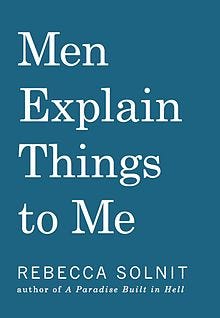
The fact that 1 in 5 women will be raped in the US in her lifetime.
That more women have been killed each year by men in UK than British troops in 3 years in Afghanistan.
That Gender Based Violence has been denominated as an epidemic by the WHO.
Inspite of that, the Geneva convention still does not consider gender as a reason to be threatened.
Men as the norm and Women as the exception: seeing reality through one prism
Aristotle put it simply: “The female is female by virtue of a certain lack of qualities. We should regard the female nature as afflicted with a natural defectiveness.”
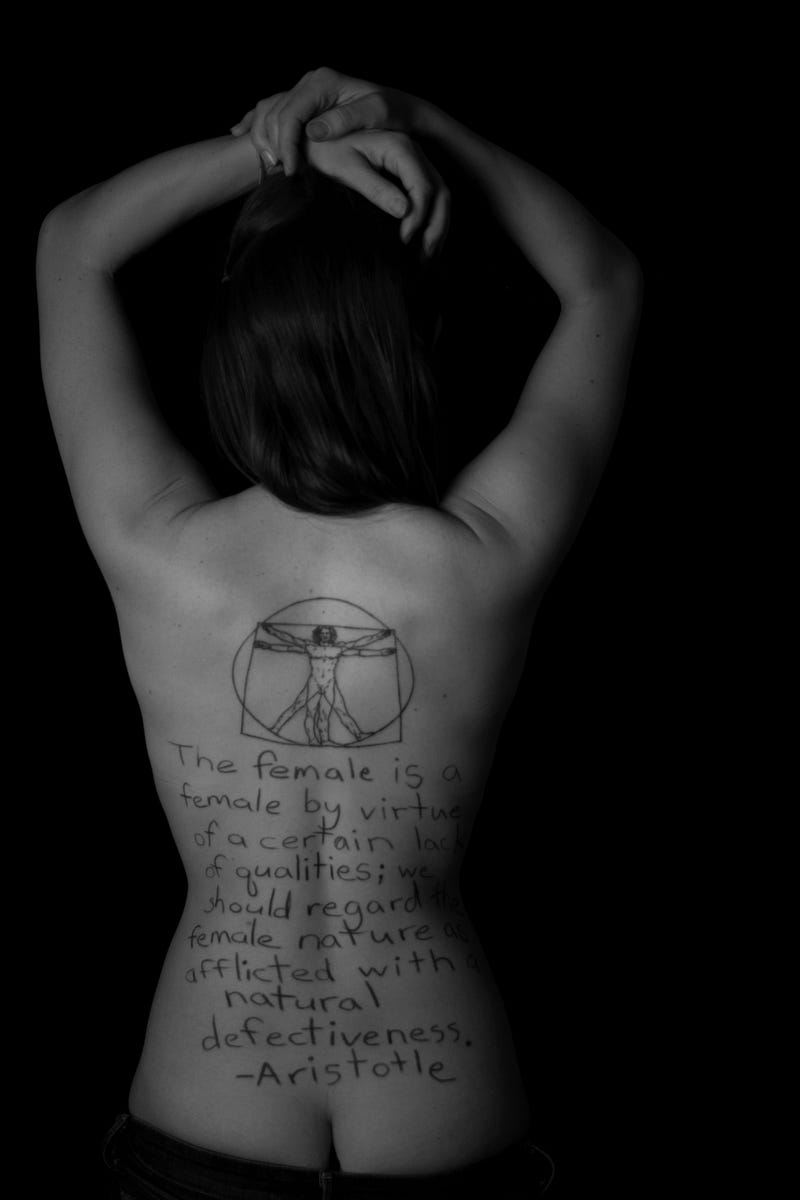
Simone de Beauvoir wrote: “Humanity is male.”
Men are considered humans and women deviant men.
The blogger Sophia Gubb talks about “Male as Default”. An example: up until April 2014, the vast majority of animals used by medical researchers to develop new drugs and treatments were male. As a consequence, more women experience side effects or less effective treatment.
The symptoms of heart attack we all know only apply to male not female.
The world is different when it has been designed around you and your needs.
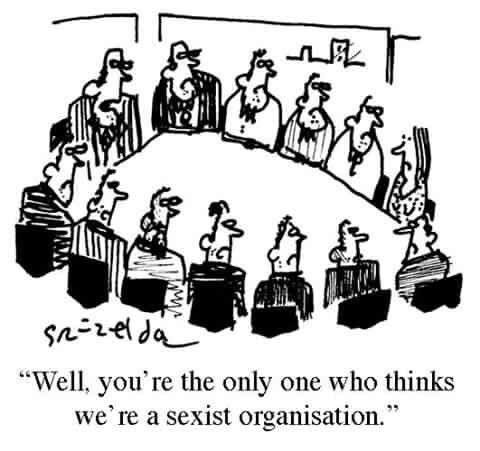
A lot of sexism is not so much deliberate and malicious as it is a problem of perspective and a lack of consideration of female needs.
Caroline thus gives the example of environmental activists movements like Greenpeace who design show off activities with consideration of female physical needs.
Or the US army which only had uniforms designed for female bodies in 2014.
Or the field of robotics where scientists shall first determine which problem is the most pressing to be solved by the robot and then which parameter to maximize. In both cases, perspective is key and we need female scientists like Angelica Lim to ensure future robots will also take into account women’s needs.
Similarly, women lead in a different way. Not so much because they are innately different, but because they experience the world differently.
Women as Allies
Mary Wollstonecraft wrote in 1792: “Considering the length of time that women have been dependent, it is surprising that women have been dependent, is it surprising that some of them hug their chains?”
Women are brought up in the same women-hating society as men, there is no logical reason why they should be free of misogynistic thinking. They internalize their own oppression and often repackage it as chosen freedom.
There is safety in joining in and attacking other women, far more so than standing against it, because you become a focus for attack.
As the Egyptian activist Mona Eltahawy says: “It’s up to you to decide where upon a spectrum of activism you stand. I am being extreme on purpose so that I am opening a bigger space for others, to be more mainstream, more average.”
Media actually paints the world more male-dominated than it is.
If we women don’t talk about what affects women, men journalists won’t.
Political news stories in the UK talks about 1 female vs 10 male when in reality there are 2 female MP for every 10 male.
So the media is not representing the world as it is.
Male dominated media tend to think that the most important stories are the ones dominated by men.
Ex: the NSA surveillance scandal is more important than the global epidemic of men killing women.
51% of the population is getting 24% of the news space.
Which offers a narrower and less diverse perspective on the world.
Because again male perspective is seen as the universal.
80% of pictures are even deemed irrelevant to the stories they accompanied: men are more likely to be featured in words and women in images. (cf. page 3 of UK papers)
Nature vs Culture
According to a study from BBC Radio 4 Today program, men and women are equally competent at looking after their baby immediately after its birth. The idea that women are predisposed to wiping bottoms is practice being interpreted as innate function. But is is the experience that obviously makes you an expert at it.
Women have for centuries been aligned with irrationality. (cf books like Men are from Mars and women from Venus)
Male anger, at the opposite, has never earned men the label of irrational.
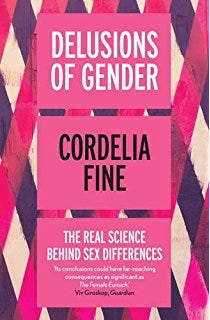
In her book Delusions of gender, Cordelia Fine shatters any claims of neurosexism. Babies are much more programmed by their parents conditioning than by their innate brain. Parents act in a different way if they know or not the sex of their babies.
An entire multi-million dollar industry has been built around the power of the subconscious to store up messages and alter our behaviours.
In her essay The Equality Illusion, Kat Banyard explains that there are no difference in frequency of assertive behaviours in babies.
But the difference lies in the way adults respond to these behaviours.
If a male baby is assertive, the caregiver would respond 41% of the times (against 10% for female babies).
When a baby is seeking attention, he gets a response 55% of the time if he is male and 15% if she is female.
So babies learn and adapt.
Pressure on physical aspect
And finally, Caroline insists on the tremendous pressure women receive about their physical appearance. Is it a hazard that
90% of all cosmetic surgery patients in the UK are women?
Can we still consider it a real choice? What about high heels?
“The average woman could learn a language or climb a mountain or get another degree with the time she’s spending worrying about how she looks.”
In Iran, Masih Alinejad set up the website My stealthy freedom to show pictures of women letting their hair run free.
She considers the prohibition of women’s hair as a form of control.
CONCLUSION
Once you control women, you control half of the society. You control the way children are raised and the future generations.
Yet, the world is rarely transformed by seismic shifts: it’s all the little individual changes we barely notice that make the difference.
Role models matter. They give young girls a place to aspire to.
Like the ones Caroline portrays in her book.
This text is a summary of extracts and quotes from “Do it like a Woman” book from Caroline Criado-Perez.
Uncategorized
